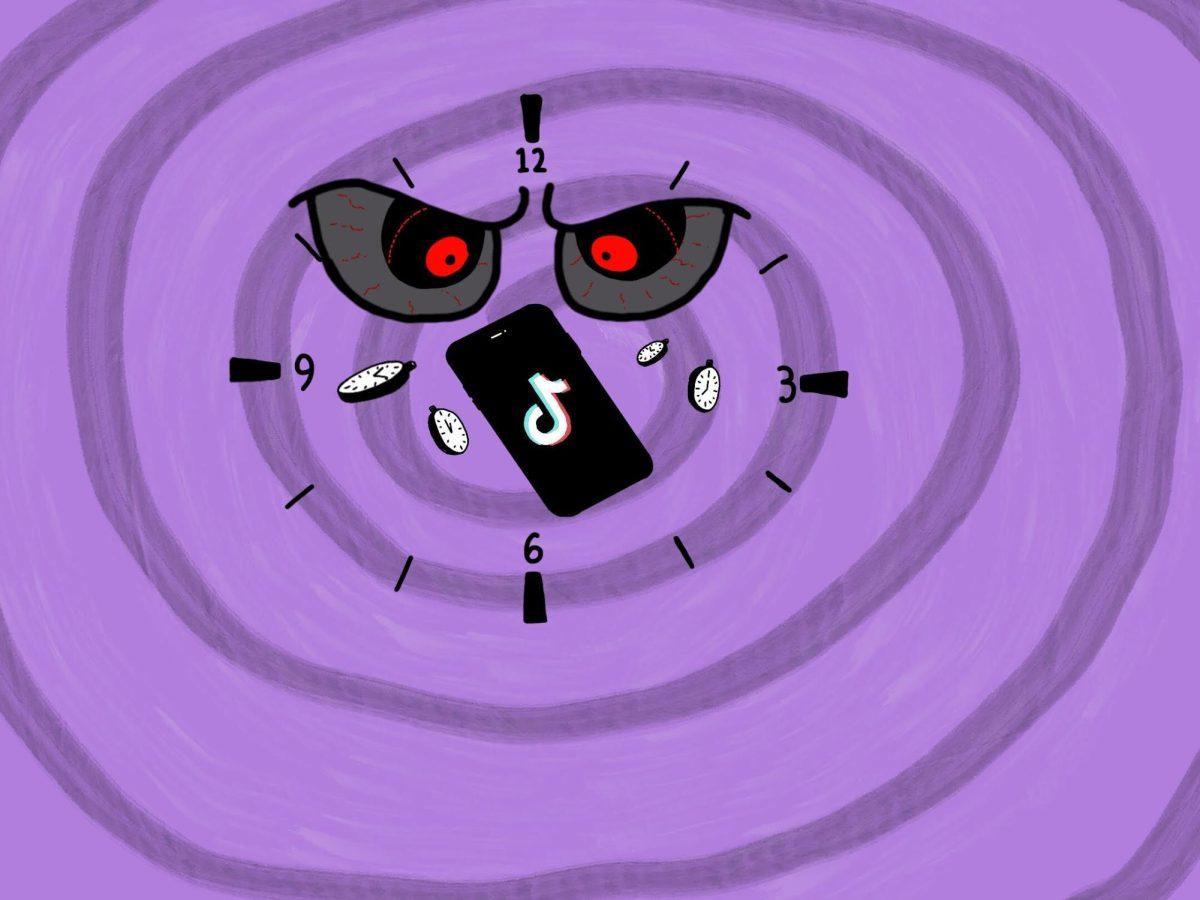
Should an app that sexualizes kids still be permitted within the United States? Opinion columnist Bj Barnes says it’s time to ditch TikTok. (Graphic by Ethan Mattson)
The bipartisan bill that rocketed to the top of national headlines after passing the House 352-65 could spell doom for everyone’s favorite Chinese spying app, TikTok.
The massively popular Beijing-based social media platform has long been under scrutiny for its alleged ties to the Chinese Communist Party. Numerous pieces of evidence show TikTok harvesting user data and tracking their usage all the way down to their individual keystrokes. Needless to say, this is the fuel behind Congress’ concerns over the app’s potential threat to national security.
While these concerns could be chalked up to just more legislative banter, the old, cranky, easily-irritable, hard-of-hearing and often unrelatable representatives may have a point with this one.
TikTok users have allowed an app that directly contradicts some of our country’s most basic values, namely the right to privacy and protecting children from exploitation, to survive despite these glaring concerns. The same app pushes heavily sexualized content in the form of young, impressionable girls who are scantily dressed onto its young users, millions of whom are minors.
The same app whose parent company ByteDance openly admitted to tracking the location of journalists who previously reported on the app’s plans to surveil American citizens.
The same app repeatedly accessed users’ sensitive personal information abroad in China, a country currently committing genocide against the Uyghurs.
Are you seeing a trend here? Time and time again we have turned a blind eye to the nefarious deeds of a company that has several not-so-secret agendas at play. TikTok is the favorite younger child we refuse to punish despite their countless offenses.
Why? Because it takes user ideas of what makes something interesting and condenses them into a customized feed of snackable content. It is the culmination of ecstasy, entertainment and laughter.
TikTok is different from other forms of social media because its uniquely addictive, all-knowing algorithm is designed to keep users engaged by not only showing them similar content to what they’ve liked in the past, but recommending videos based on a creators’ race, age or facial features. Not to mention it’s more used than Google to access information.
Eventually, going to TikTok for your source of news and entertainment becomes an unconscious impulse. This impulse, paired with ego-defense mechanisms, is the reason people, perhaps even yourself, refuse to delete or even acknowledge that this app is a serious detriment to kids, teens and all users alike. This opens the door for echo chambers, meaning TikTok’s, mostly young users are exposed to static content that reinforces pre-existing beliefs. In a sense, TikTok knows you better than you know yourself.
This is without even mentioning the downsides or side effects from indirectly supporting the platform by keeping the app on your phone. While you may not be actively contributing to the sexualization of minors or the censorship of the less desirable, you are involved in “passive complicity,” or when an individual doesn’t directly engage in harmful behaviors but enables those actions through their own choices or inactions.
It is precisely these inactions that put us in this mess to begin with, which brings me to my final point.
How much are you willing to sacrifice for entertainment? How much do thirst traps and those 15-second videos with an amusing caption over a sped-up top-40 song really mean to you? Is it enough to give up your personal information or knowingly support the digital sexual solicitation of children?
While the decisions the bureaucratic paper pushers in Washington make on your behalf may seem so far removed from your daily life to even bother paying attention to, this time it’s different.
I’m imploring you to take a fraction of the time you would normally spend aimlessly scrolling TikTok and instead contact our state senators, John Cornyn and Ted Cruz, to advocate for the banning or selling of TikTok. Now’s the time to voice your opinion.
Or you could do the same thing you’ve been doing since you retracted your initial “I’ll never download TikTok” statement and spend the next five, 10 or 60 minutes trying to reach the bottom of the content garbage bin and open your “For You Page” on TikTok.
Aggies, the choice is yours.
Benjamin Barnes is a telecommunication media studies senior and opinion columnist for The Battalion.